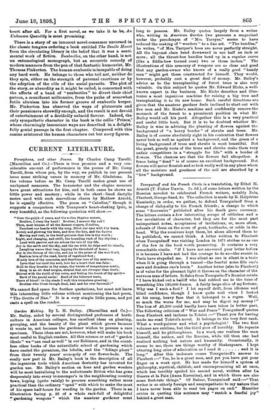CURRENT LITERATURE.
Persephone, and other Poems. By Charles Camp Tarelli. (Macmillan and Co.) —There is true promise and a very con- siderable amount of performance in the poems of Mr. Camp Tarelli, from whose pen, by the way, we publish in our present issue some striking verses in memory of Mr. Gladstone. In the volume before us Mr. Camp Tarelli makes great use of unrhymed measures. The hexameter and the elegiac measure
have great attractions for him, and in both cases he shows no little power and mastery ; while in the short - lined dactylic
metre used with such marvellous charm by Mathew Arnold, he is equally effective. The poem on " Catullus," though it suggests a comparison with Tennyson's heart-shaking lyric, is very beautiful, as the following quotation will show :— " Over the gulph of years, and the Linen Stygian waters,
Brother, I clasp thy hand I Brother, I answer thy call I Thou, most human of all the Roman singers, Ostullus,
Tenchest our hearts with thy song, fillest our eyes with thy tears.
Lovely and glowing the tints, and firm the line, and the figures Moving and real, in the brief pictures that live in thy words ; Light, and changing, and swift, the bounding rash of thy rhythm ; Loud with passion and sin echoes the tale of thy life.
Joy in the earth and the sky, and the sea with its ships and its island Laughing waves that leap, lapping the threshold of home ; Joy in the throng of the city, and joy in the green of the woo 11,ni, Restless love of the road, hurry of vagabond feet ; :Kindly love of thy comrades, and deathless love of thy mistress, Love that tortured thy soul, love for a heart that was false: 'Still do they breathe in thy songs, thy bursts of tempestuous ninsIc, Sung in an olo dead tongue, strains that are stronger than death.
Stirred with the thrill of thy voice, and feeling the touch of thy spirit—
Bard of the genial smile! Bard of the bitterest tears, Tears of blood! to thy shade I waft this tremulous greeting: Brother who livest thongh dead, hail and for ever farewell I"
We cannot find space for further quotations, but must not leave this interesting little volume without mentioning the last poem, " The Grotto of Han." It is a very simple little poem, and yet casts a spell on the reader.


































 Previous page
Previous page